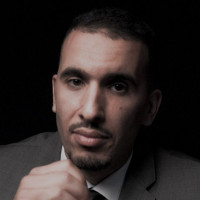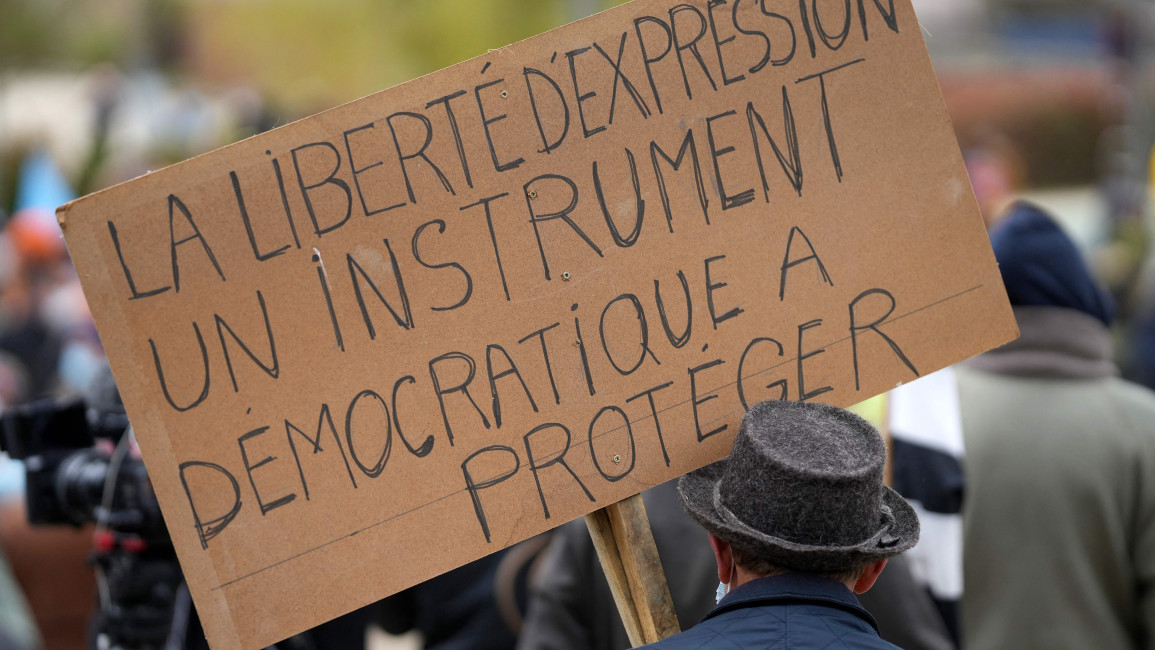
Macron’s France is no defender of press freedoms
This article is part of The New Arab’s States of Journalism series, a sustained exploration of freedom, repression, and accountability in MENA and global media landscapes. Read more of the series’ articles here.
When Emmanuel Macron yelled at a French journalist in Beirut for publishing an article revealing his secret meeting with Hezbollah leaders, outlets around the world raised eyebrows. Ironically, moments before the ‘incident’, he had taken the floor to express how the president of France “should never interfere with the editorial line chosen by journalists”.
In many ways, this sums up the hypocritical nature of Macron’s line on freedom of the press and expression.
And there are many more examples.
Who could forget Macron’s defence of the right to caricature Islamic figures, which caused uproar around the Muslim world? Well, it seems even this was limited. When barely two months after the Beirut speech, the president was himself subject to a critical cartoon by Khaled Moulaye Idriss, the cartoonist’s post was terminated by the French embassy in Mauritania.
During the Yellow vest movement that was brutally opposed by Macron, journalists regularly sustained grave injuries at the hands of the police. There were several incidents of journalists getting beaten to the ground, shot with the infamous Defence Ball Launchers (LBDs) in La Rochelle and in Paris where even their equipment was confiscated.
The French president’s concerns over the lives and freedoms of journalists, was nowhere to be found, however.
''It should go without saying that France desperately needs a more diverse and democratised media landscape that would involve a cultural renewal so that journalists are free to inform citizens about who is governing their affairs and how, without fear.''
As the movement lost steam, and following the terror attacks at the end of 2020, the government seized the opportunity to further target journalists. They introduced the “Comprehensive Security Bill” which included the controversial article 24, that sought to prohibit journalists from filming the police in public spaces.
Huge demonstrations opposing this move had erupted during which protestors -made up of many media workers- were confronted with a naked display of state violence and harassment. This was best illustrated by the gruesome bleeding face of Ameer al Halbi.
According to a collective of journalists, these attacks were deliberate and prompted Reporters Without Borders (RSF) to sue the French police for “wilful violence”.
Despite the defeat of article 24 by the Constitutional Council, what took place during the protests was severely traumatising for many in the field.
Ownership in the media landscape is another source of grave concern when it comes to the state of press freedoms in France.
There is unsurprisingly a correlation between who owns media outlets, and the bias associated to them.
During the Yellow Vests movement, privately owned outlets like BFM TV, LCI and CNEWS, were perceived to be taking side against the protestors. The accusations of bias coverage even led to the regulatory body, the Conseil supérieur de l'audiovisuel (CSA) to call the channels into in a meeting during which they were reminded of their ‘duty’ to fairly report on events.
In France, 11 billionaires own the overwhelming majority of media outlets, which often raises questions about how they are run.
Bernard Arnault, for example, who directly and indirectly owns right-wing, pro-market outlets Challenges and L’Opinion, as well as the more liberal Slate, recruited the former head of domestic intelligence Bernard Squarcini to spy on François Ruffin, the head of the publication Fakir, who exposed the French billionaires’ brutal management methods in his film “Merci Patron!”. None of this has stopped Arnault from hypocritically presenting himself as a media “patron”.
Meanwhile, another billionaire club member Vincent Bolloré, through CNEWS – which he owns alongside radio station Europe 1- gave ample airtime to far-right figure Eric Zemmour in order to boost his presidential run.
When Denis Robert, a long time journalist at Libération published his investigations which contained explosive revelations of money laundering, tax evasion and corruption, the backlash was brutal and immediate. Denis Robert spent ten years in and out of court facing numerous accusations including of committing libel. He eventually won but at a tremendous personal cost.
The intimidation of journalists also extends to institutions of the Republic.
In 2018, the Alexandre Benalla affair broke. The story followed Macron’s aid who was filmed wearing police uniform and beating demonstrators. Following the scandal, several journalists faced the brunt of government orchestrated intimidation for exposing the president’s personal aide.
Investigative website Mediapart was raided by the police, Ariane Chemin from Le Monde as well as seven other journalists were called in for interrogation by the domestic intelligence agency.
These methods, which one would have imagined and expected from dictatorships, came from the land of so-called Liberté, Égalité and Fraternité.
When official judicial inquiries began, Macron’s reaction was effectively: “Come and get me”.
Similar intimidation tactics were once again used against the group of journalists who revealed the extent of France’s arms trade with Saudi Arabia and how it fuelled the massacres of civilians in Yemen.
The willingness to control journalists was further highlighted by Cedric O, Macron’s head of digital affairs when he called for the establishment of a “Journalism Board” that would regulate and supervise the entire sector. An idea that reporter Gaspard Glanz called a step back to the “Vichy era”.
Indeed, the weight of the task at hand for the actual defence of press rights and freedoms is considerable.
It doesn’t help when some journalists counter these efforts by crossing the line, however. Notable examples include CNEWS host Pascal Praud dining with Emmanuel Macron, as well as Paris Match and Le JDD journalists Patrick Mahé and Jérôme Bellay accepting to be billionaire Bolloré’s “yes men”. The aim was to promote his ideological views in a media empire where obedience to the boss is more important than the duty to inform the masses.
It should go without saying that France desperately needs a more diverse and democratised media landscape that would involve a cultural renewal so that journalists are free to inform citizens about who is governing their affairs and how, without fear.
The pressure, hostility and violence that journalists are faced with in France, on top of the intimidation from those who hold power and political agendas, is fed by the long monarchical tradition that still permeates institutions and the organisation of power.
In this context, it is almost no surprise that France is ranked 26th on RSF’s freedom of the press index, or that the Council of Europe summoned France to allow journalists to safely do their job.
Perhaps what best symbolises the position of journalists in the country, is the fact that Macron was the first Western president to visit Mohammed bin Salam in Saudi Arabia following the ruler’s role in the killing of Jamal Khashoggi.
Yasser Louati is a French political analyst and head of the Committee for Justice & Liberties (CJL). He hosts a hit podcast called "Le Breakdown with Yasser Louati" in English and "Les Idées Libres" in French.
Follow him on Twitter: @yasserlouati
Have questions or comments? Email us at: editorial-english@alaraby.co.uk.
Opinions expressed in this article remain those of the author and do not necessarily represent those of The New Arab, its editorial board or staff.




